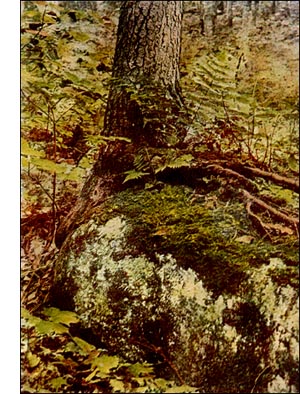Dainty Cedar Moss
 The Dainty Cedar Moss, Hypnum (Thuidium) delicatulum, Linn.
The Dainty Cedar Moss, Hypnum (Thuidium) delicatulum, Linn.Habit and habitat.-Creeping fern-like plants on ground, roots of trees, and rocks. Common and exceedingly beautiful. The specimen photographed grew on a stone in a babbling brook.
Name.-The Dainty Cedar Moss is most attractive ; it was well known to the great Swedish botanist, Carolus Linnaeus, who gave it the specific name delicatulum, dainty.
Plant (gametophyte). -Three times feather-branched, the primary stems densely rooting.
Leaves.-The stem-leaves densely crowded, enlarged at the base ; branch-leaves broadly oval ; apex long-pointed ; base concave ; vein strong ; margin serrate ; cells small, the apical truncate and crowned with 2 to 3 acute papillae ;Paraphyllia of varied forms.
Leaves at the base of the pedicel.-Long-ciliate.
Habit of flowering.-Male and female flowers on separate plants (dioicous).
Veil (calyptra).-Split up one side.
Spore-case.-Cylindrical, arched.
Pedicel (seta).-One to one-and-a-half inches long.
Lid (operculum).-Conical.
Annalus.-Double.
Teeth (peristome).-Double as in Hypnum.
Spores.-Mature in winter.
Distribution.-Europe, North and South America.